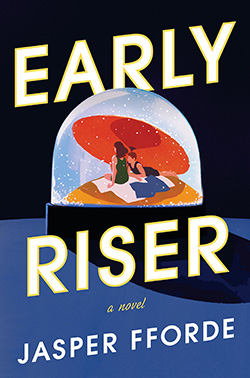Once upon a time, not so very long ago at all, you could set your watch by Jasper Fforde. This was way back when we wore watches that needed setting, but something else was significantly different in those distant days too. Something must have been, because from his debut with The Eyre Affair in 2001 until relatively recently, the former focus puller managed to put out a book a year with the kind of effortless ease that made other authors look lazy. These weren’t just books, either: these were remarkably good books, clever, funny and unexpectedly authentic tales of metafictional mystery and murder most horrid lashed with literary wit and a generous helping of humour.
Then came the 2014 release of the last of The Last Dragonslayer saga: the final volume of an arguably slighter series for younger readers that nevertheless delighted this miserable old critic. When 2015 came and went without a new book bearing the aforementioned funny man’s brand, I was crestfallen, but fine. In 2016, alas, I started to get antsy. Then came 2017: a terrible year for any number of reasons, of which perhaps the most overlooked is that it bore no new Jasper Fforde book. This year, though, the author brings his unexpected “creative hiatus” to a conclusion with Early Riser, a satirical standalone fantasy about social control and sleepy people which, given the length of time it took, I expected to be among his best efforts. Either that or a dreadful mess.
Early Riser is neither, which goes to show what I know. Oft-amusing, but only occasionally likely to elicit laughs, and as imaginative as anything he’s ever written, if woefully overburdened by worldbuilding, Fforde’s long-awaited new novel is ultimately a bunch of fun, yet it fails to leave a lasting impression like the likes of Shades of Grey, say.
It all takes place in Wales—but not Wales as you might or might not know it. The entirety of Early Riser’s Albion, Wales and all, is an alternate vision of Great Britain with, if you can credit it, even worse weather. So much worse, in fact, that 99% of the population has no choice but to hibernate, like polar bears, through the apocalyptic winters. Hibernation, however, is dangerous. If you don’t have enough body fat stored away to see you through the freezing season, you might not wake up when the spring comes.
Buy the Book


Early Riser
From this fear, it follows that aspects of Albion’s culture stand in insightful opposition to our own. Skinny malinkies, for instance, are shunned in favour of the full figured—the most attractive people here have love handles instead of six packs—and there are several celebrations specifically designed to encourage overeating:
Fat Thursday had long been established as the first day of serious gorging, the time to indulge in the latest faddy get-fat-quick diets and to take a vow of abstinence from the mass-stealing sin of exercise. Yesterday you could run for a bus and no one would turn a hair, tomorrow it would be frowned upon as almost criminally irresponsible.
The preciousness of energy in Albion also affects how its people see dreams. To most, they’re “an anachronistic and outmoded pursuit that signified little and did nothing except sap one’s carefully accrued weight during hibernation.” To wit, a dream-free sleep is the ideal, and thanks to Morphenox, a trademarked HiberTech drug that suppresses the subconscious during one’s slumber, it’s an within reach! Albeit “only if you have the luck, cash or social position to be granted its use.”
It’s for this very reason—to ensure a supply of Morphenox going forward—that Early Riser’s distractingly hapless protagonist Charlie Worthing takes a job at the outset of the text as a novice Winter Consul, making him one of the 1% of Albionites who stay awake through the winter. Winter Consuls are caretakers, basically, whose primary responsibility is to ensure the safety of the legion of sleepers, but they have other duties too, as Charlie finds out on his almost-fatal first day, when his boss is shot after being caught collaborating with a bodyfarming Footman. It’s only thanks to the intervention of Aurora, the head of HiberTech Security out of Sector Twelve, that Charlie and his charge, a tricksy nightwalker named Mrs Tiffen, survive to see SlumberDown.
I can only apologise for the sentences you just read, but they serve to show how impenetrable Early Riser is initially. You’ll pick up most of the lingo as you go, of course, but the early going isn’t easy reading by any means, and unfortunately, the first third of the book is full of it—full of it at the expense of, you know, character and plot and whatnot. It is, however, worth unpacking at least a little of the jargon Fforde builds out his world with, not least the notion of nightwalkers:
Returning from the depths of hibernation was never without risk. If the minimal synaptic tick-over that took care of nominal life functions was halted, you’d suffer a neural collapse and be Dead in Sleep. If you ran out of fats to metabolise into usable sugars, you’d be Dead in Sleep, If the temperature fell far too quickly, you’d be Dead in Sleep. Vermin predation, CO2 build-up, calcitic migration, pre-existing medical condition or a dozen or so other complications—Dead in Sleep.
But not all neural collapses lead to death. Some, like Mrs Tiffen, who was on Morphenox—it was always the ones on Morphenox—awoke with just enough vestigial memory to walk and eat. And while most people saw nightwalkers as creepy brain-dead denizens of the Winter whose hobbies revolved around mumbling and cannibalism, we [Consuls] saw them as creatures who had returned from the dark abyss of hibernation with most of everything left behind.
 Just as soon as the pace picks up enough for a plot to be spotted, nightwalkers play a pivotal part in Early Riser’s narrative. You see, there are those who believe they may retain some part of their essential selves, and those who don’t; there are those who have questions, and those who aren’t interested in the answers. It just so happens that the latter party, most of whom are on HiberTech’s payroll, have vested interests in an industry that involves retraining the brains of tricksy types like Mrs Tiffen to perform menial labour for free—an industry that requires a ready supply of nightwalkers to turn a profit.
Just as soon as the pace picks up enough for a plot to be spotted, nightwalkers play a pivotal part in Early Riser’s narrative. You see, there are those who believe they may retain some part of their essential selves, and those who don’t; there are those who have questions, and those who aren’t interested in the answers. It just so happens that the latter party, most of whom are on HiberTech’s payroll, have vested interests in an industry that involves retraining the brains of tricksy types like Mrs Tiffen to perform menial labour for free—an industry that requires a ready supply of nightwalkers to turn a profit.
I won’t give anything else away, but even from here, I think the sides seem clear. That they don’t to Charlie until the very last chapters of Early Riser is one the book’s biggest issues. Though he knows right from wrong, he spends nearly the whole novel “dancing around the periphery [of the issues] like a ninny,” blundering about from one front to another whilst telling everyone everything with next to no thought about the consequences. As Aurora’s other half Tocatta tells him:
“Most novices we get are either burned-out ex-military with a thousand-yard stare, gung-ho idiots or saddos who might as well have Kill Me Now printed on their forehead. You’re not any of those. But I can’t figure out if you’re a clever person pretending to be thick, a thick person pretending to be clever, or just a chancer stumbling through the Winter without any sort of plan or thought at all.”
Charlie himself—and by extension the author—shows enough self-awareness to plump for the third option at this point, but knowing the mistakes you’ve made doesn’t make the mistakes themselves less frustrating, I’m afraid. And that really is Early Riser. It’s interesting in the end, and full of neat ideas that hold a far-from-flattering mirror to elements of our own existence, but so poorly paced and plot heavy that the remainder is the rub. Similarly, the setting is engrossing and almost criminally original, but Albion is a world built on the back of interminable info-dumps and masses of jargon. And all this hangs on a central character who might be witty and well-meaning, but proves so exasperatingly passive that even he might as well be asleep.
Which is a shame. Early Riser has a lot to say and, for the most part, says it in an interesting way. The message, in short, is sound—but the medium, in this particular instance? Maybe not so much.
Early Riser is available now in the UK with Hodder & Stoughton, and publishes February 2019 in the US with Viking.
Niall Alexander is an extra-curricular English teacher who reads and writes about all things weird and wonderful for The Speculative Scotsman, Strange Horizons, and Tor.com. He lives with about a bazillion books, his better half and a certain sleekit wee beastie in the central belt of bonnie Scotland.










